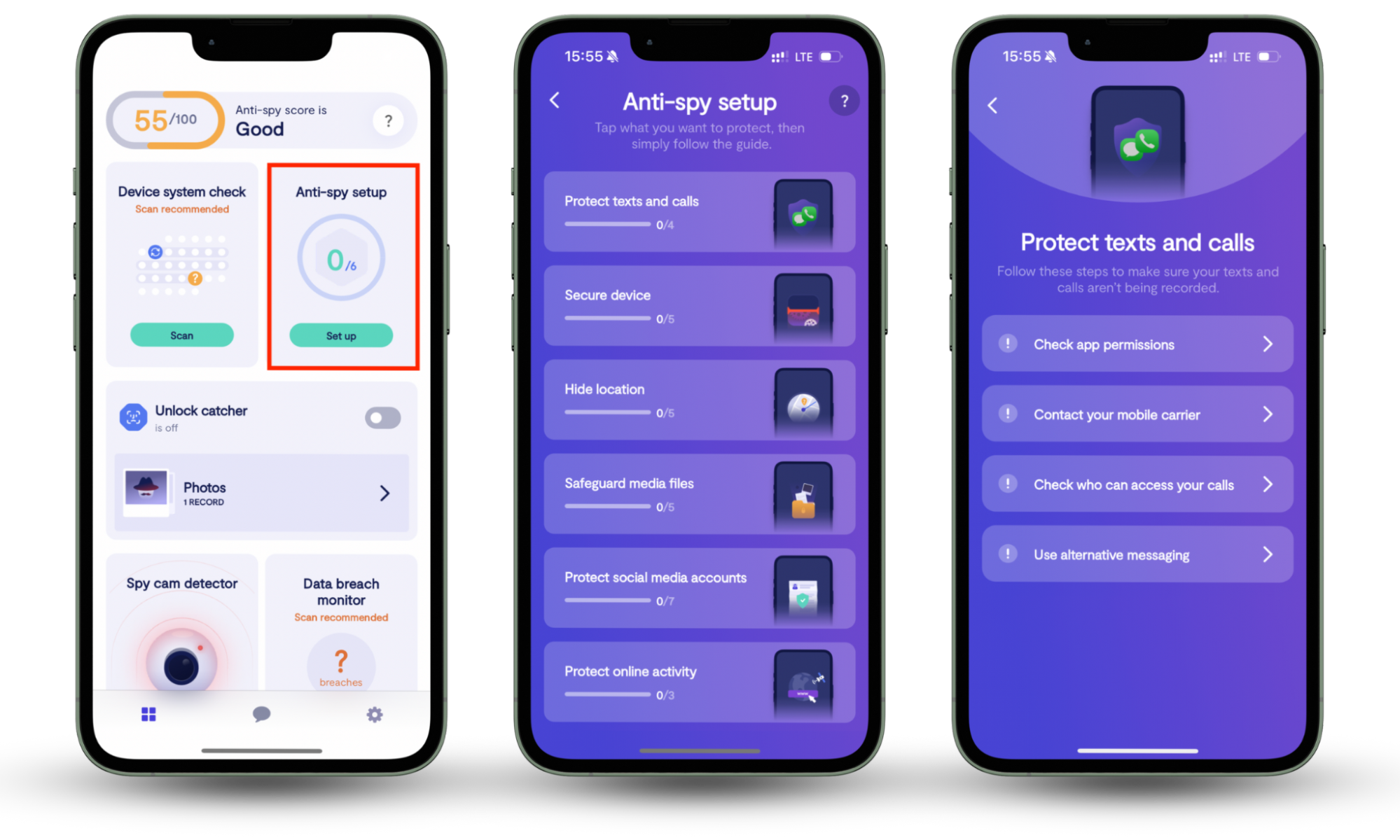Table of contents
- What is Alexa?
- Is Alexa a spying device?
- How does Alexa work?
- Can Amazon Alexa spy on you?
- Сan someone use Alexa to spy on you?
- What are the risks of using Alexa?
- 1. Amazon Alexa shares data with third parties
- 2. Amazon employees can listen to your voice recordings
- 3. Alexa records more than you think
- 4. Amazon Alexa doesn't always delete your data when notified
- 5. Alexa makes mistakes
- How to protect yourself from Alexa spying
- Is Alexa a security risk
What is Alexa?
Alexa is Amazon’s virtual assistant that responds to voice commands and performs various tasks. When paired with devices like Amazon Echo, Alexa can play music, provide weather updates, control smart home devices, and more.
Is Alexa a spying device?
No, Alexa is a virtual assistant rather than a spying device. However, it continuously listens for its wake word to activate, which raises many privacy concerns. Misinterpretations of the wake word and unauthorized access to recordings pose privacy risks, but Amazon does put measures in place to protect your data and privacy.
Note
While Alexa isn't a spying device, numerous spyware and monitoring apps are available on app stores. You may wonder, are spy apps illegal? They are; however, many bypass legal issues by marketing themselves as "family monitoring" apps, requiring user consent for installation.
How does Alexa work?
Alexa operates by waiting for its wake word, usually “Alexa.” After heading it, the device captures and sends the next voice command to Amazon’s cloud servers. Advanced artificial intelligence (AI) algorithms receive and process the request, interpret the command, and then find relevant information or perform the requested task.
People often wonder, is Alexa always listening? The answer is yes—it’s always waiting for the wake word and recording if it hears it.
Can Amazon Alexa spy on you?
It depends. Amazon doesn’t record every conversation you have in your house. If it doesn’t hear (or think it hears) the wake word, it won’t record at all. But whenever you activate it, it keeps a log of the instance and stores the conversation on its servers.
A 2022 privacy study found that the Amazon smart speaker ecosystem collects far more data than most people would expect, shares it with third parties, and uses it to serve personalized ads. Worse yet, Amazon’s policies are unclear about how they use your data or share it with others.
The situation is so bad that the US Federal Trade Commission imposed a $25 million fine on Amazon for privacy violations relating to the Alexa voice assistant based on similar findings.
So, can Alexa spy on you? Not in the way you think. But it does use your interaction data to work out your interests, sell that information to third parties, and send you targeted ads.
Сan someone use Alexa to spy on you?
Can Alexa be used as a listening device? Yes, it can. Alexa’s “Drop-in” feature lets you connect with another Alexa-enabled device, using them as two-way intercoms. While this might be useful for families or friends, it can also be used to spy on unsuspecting victims.
The problem is that once you get permission to drop in on a device, you can do so whenever you like. The other device will display a light and make a sound, indicating that you’ve connected, but it won’t ask you to confirm the connection.
This feature enables someone to set up an Alexa device, establish permission to drop in, and then give the Alexa to someone else. Then, they can drop in and listen to conversations near the other Alexa at any time.
What are the risks of using Alexa?
Here are the main five risks of using Amazon’s Alexa-powered devices:
1. Amazon Alexa shares data with third parties
Amazon asserts that it doesn’t sell personal information to third parties. Yet it partners with many companies where data sharing, rather than selling, might take place. A prime example is Alexa Skills, an app that enables users to add various functions from third-party developers available on the Amazon Marketplace.
Through these interactions, Amazon shares substantial data, including recorded transcripts, with developers. The 2022 study mentioned earlier found that many developers leveraged this personal data for targeted advertising, potentially going against Amazon’s privacy policy.
2. Amazon employees can listen to your voice recordings
Amazon has previously admitted that its employees listen to customer voice recordings from Alexa-enabled smart speakers. In these instances, Amazon employees (and external contractors) had access to customer names, addresses, account numbers, and serial numbers. Several employees reported hearing private and disturbing moments.
While this is done to improve Amazon’s smart assistant technology, it represents a serious breach of privacy—especially when Amazon claims that “Alexa lives in the cloud.”
3. Alexa records more than you think
Alexa listens continuously for its wake word and only begins recording after hearing it. However, the device may mistakenly activate due to words or sounds that resemble the wake word. These "false wakes" can result in Alexa recording more than intended.
One study found that devices like Alexa accidentally wake up around 19 times a day, thinking they’ve heard their wake word. In around half of these cases, recorded conversations are more than six seconds long.
Although Amazon has taken steps to improve wake-word accuracy and offers users the ability to review and delete recordings, unintended activations remain a concern for privacy-conscious users.
4. Amazon Alexa doesn't always delete your data when notified
As previously mentioned, Amazon was hit by a $25 million dollar fine for privacy violations—which it agreed to pay. The FTC fined Amazon based on a 2019 complaint that the company:
- Retained children’s voice recordings for longer than allowed by US law.
- Made deceptive claims about how it uses recordings.
- Didn’t delete user data when requested and didn’t inform users when non-compliance with laws took place.
If you can’t trust Amazon to handle your children’s data, can they be trusted to safeguard yours?
5. Alexa makes mistakes
Beyond mistakenly hearing a wake word and recording conversations, Alexa makes other mistakes. For example, in 2018, it recorded a private conversation and sent it to one of the user’s contacts without consent. In this case, the user didn’t even say the wake word.
Another example comes from 2018 when Amazon sent 1700 voice recordings to the wrong user. The voice recordings contained enough personal information to identify the user, his partner, and their physical location.
How to protect yourself from Alexa spying
If you’re intent on using Alexa, there are a few things you can do to protect the voice assistant from spying. Here are five easy steps to limit how much Alexa can spy on you:
- Change the wake word. Switch Alexa’s wake word from “Alexa” to something less commonly used in conversation. This will reduce accidental activations and minimize the risk of unintentional recordings.
- Turn off wake-word listening. To make sure Alexa isn’t listening all the time, disable wake word detection when the device isn’t in use. You can turn it off using the Alexa app or by pressing the mute button on the device, preventing it from capturing sound until you reactivate it.
- Delete unused skills. Regularly remove any Alexa Skills you no longer use. Each skill has different data-sharing policies, so reducing the number of active skills can reduce data leaks from third-party developers.
- Check privacy settings. Review and update your privacy settings in the Alexa app. You can choose how to manage voice recordings, enable voice deletion, and get a better idea of how Amazon uses your data.
Finally, we recommend using Clario Anti Spy’s Anti-spy setup. Clario Anti Spy offers step-by-step instructions on how to configure your mobile device for enhanced privacy. To use Clario Anti Spy:
- Download Clario Anti Spy and create an account.
- Under Anti-spy setup, press Set up.
- Follow the on-screen instructions to secure your device and prevent untrustworthy apps from collecting your data.

Is Alexa a security risk
Alexa spying on users is a significant problem that’s only going to get worse as AI technology becomes more common. While these assistants offer convenience, they also pose privacy and security risks.
Proactively managing your privacy settings, staying informed about data practices, and using powerful privacy tools like Clario Anti Spy means you can enjoy the benefits of Alexa while safeguarding your personal information. Take control of your privacy today with Clario Anti Spy!


